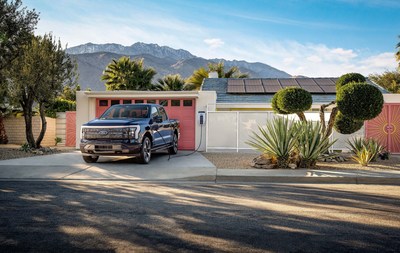Electrifying the future: Duke Energy to explore how Ford F-150 Lightning all-electric trucks can serve as a grid resource in Florida
Duke Energy is launching a pilot program in Florida to explore the use of Ford F-150 Lightning electric trucks as a grid resource. The program will test vehicle-to-grid (V2G) capabilities, allowing the trucks to supply power to homes and the grid during outages and peak demand periods. This initiative includes adding five trucks to Duke's fleet for extensive research on their battery performance and integration with solar energy systems. Duke aims to benefit customers and enhance the grid's efficiency while supporting its goals for clean energy transition by 2030 and net-zero carbon emissions by 2050.
- Pilot program to test Ford F-150 Lightning integration as a grid resource.
- Potential to enhance grid reliability and customer service during outages.
- Focus on real-world applications with distributed energy resources.
- Supports Duke Energy's clean energy goals for 2030 and net-zero emissions by 2050.
- None.
Insights
Analyzing...
- Powerful Ford F-150® Lightning™ all-electric truck batteries have vehicle-to-grid two-way charging capabilities.
- Growing number of electric vehicle batteries could provide extensive value to customers and grid.
ST. PETERSBURG, Fla., Aug. 16, 2022 /PRNewswire/ -- Duke Energy (NYSE: DUK) is looking at new ways customers in Florida may one day be able to use two-way, or bidirectional, charging from electric vehicles to power their own homes during outages and to help support the power grid.
The company will launch a research and development pilot program in the state to test and evaluate the viability of the new Ford F-150 Lightning all-electric truck's high-capacity batteries as a grid edge resource that could help transform the energy system.
As part of the pilot, Duke Energy will add approximately five Ford F-150 Lightning trucks to its Florida fleet and perform additional testing of the technology, with a focus on leveraging homes that have solar energy and stationary storage. Using the Ford Charge Station Pro and Intelligent Backup Power Home Integration System's bidirectional charging infrastructure, the company will perform extensive testing using the vehicles to feed and draw energy from the power grid. Vehicle-to-grid (V2G) integration will push and pull energy between the connected electric trucks and the grid in a bidirectional energy flow.
The pilot will focus on real-world use cases with the Ford F-150 Lightning to benefit the grid – such as how the vehicle interacts with other customer-owned distributed energy resources (like rooftop photovoltaic – or PV – solar and customer home batteries), how the truck's battery performs powering customers' homes during an outage, how the vehicles will be used to feed the grid during peak times of use, and how such usage might impact the trucks' batteries over time.
"We're continually testing clean energy innovations to gauge how they perform in complex real-life scenarios," said Lon Huber, Duke Energy's senior vice president of pricing and customer solutions. "Like our customers, we're excited about the prospects of these advancements, and we're working to evaluate them in controlled environments so we can find ways to maximize their value and benefits."
Testing driven by the future
The F-150 Lightning is the smartest, most innovative F-150 that Ford has ever built – a 10-kilowatt smart distributed energy resource with extensive and continuous software updates – and offers the functionality of a full-sized truck with even more innovative features, designed for electric charging rather than fuel consumption.
"Ford's electric vehicles are unlocking new possibilities in energy management for our customers, becoming valuable energy storage sources that are changing the game on the benefits an EV can deliver," said Steven Croley, chief policy officer and general counsel, Ford Motor Company. "Alongside Duke Energy and our mutual customers, we're working to fine-tune and expand these capabilities that will not only power their lives, but also accelerate the development of a less carbon-intensive grid."
All-electric vehicles like the Ford F-150 Lightning contain an electric motor instead of an internal combustion engine and essentially can act as an electric power generator on wheels. Expanded storage through connected EV batteries offers more capacity to capture and store valuable energy. That energy can then be used for customers' personal needs (vehicle-to-home, or V2H) or delivered back to the power grid (V2G) to help support the demand for electricity when it is highest.
With the F-150 Lightning Ford introduced Intelligent Backup Power, a feature that when purchased with the necessary installation equipment can allow customers to power their homes for up to 10 days during a power outage, all from the vehicle's battery. Sunrun, one of the nation's leading home solar panel and energy storage companies, is the preferred installer for F-150 Lightning home charging solutions and will contribute to the charging and Intelligent Backup Power infrastructure for the Ford-150 Lightning.
"The potential is enormous when it comes to emerging vehicle-to-grid technologies," said Huber. "As a clean energy leader, we're committed to helping shape the net-zero-carbon landscape. This includes working hands-on to validate new technologies that can benefit our customers and sustain the clean, smart and reliable grid of the future."
Duke Energy
Duke Energy (NYSE: DUK), a Fortune 150 company headquartered in Charlotte, N.C., is one of America's largest energy holding companies. Its electric utilities serve 8.2 million customers in North Carolina, South Carolina, Florida, Indiana, Ohio and Kentucky, and collectively own 50,000 megawatts of energy capacity. Its natural gas unit serves 1.6 million customers in North Carolina, South Carolina, Tennessee, Ohio and Kentucky. The company employs 28,000 people.
Duke Energy is executing an aggressive clean energy transition to achieve its goals of net-zero methane emissions from its natural gas business and at least a
Duke Energy was named to Fortune's 2022 "World's Most Admired Companies" list and Forbes' "America's Best Employers" list. More information is available at duke-energy.com. The Duke Energy News Center contains news releases, fact sheets, photos and videos. Duke Energy's illumination features stories about people, innovations, community topics and environmental issues. Follow Duke Energy on Twitter, LinkedIn, Instagram and Facebook.
About Ford Motor Company
Ford Motor Company (NYSE: F) is a global company based in Dearborn, Michigan, that is committed to helping build a better world, where every person is free to move and pursue their dreams. The company's Ford+ plan for growth and value creation combines existing strengths, new capabilities and always-on relationships with customers to enrich experiences for and deepen the loyalty of those customers. Ford develops and delivers innovative, must-have Ford trucks, sport utility vehicles, commercial vans and cars and Lincoln luxury vehicles, as well as connected services. Additionally, Ford is establishing leadership positions in mobility solutions, including self-driving technology, and provides financial services through Ford Motor Credit Company. Ford employs about 182,000 people worldwide. More information about the company, its products and Ford Credit is available at corporate.ford.com.
Duke Energy media contact: Logan Kureczka
800.559.3853
![]() View original content to download multimedia:https://www.prnewswire.com/news-releases/electrifying-the-future-duke-energy-to-explore-how-ford-f-150-lightning-all-electric-trucks-can-serve-as-a-grid-resource-in-florida-301606786.html
View original content to download multimedia:https://www.prnewswire.com/news-releases/electrifying-the-future-duke-energy-to-explore-how-ford-f-150-lightning-all-electric-trucks-can-serve-as-a-grid-resource-in-florida-301606786.html
SOURCE Duke Energy









